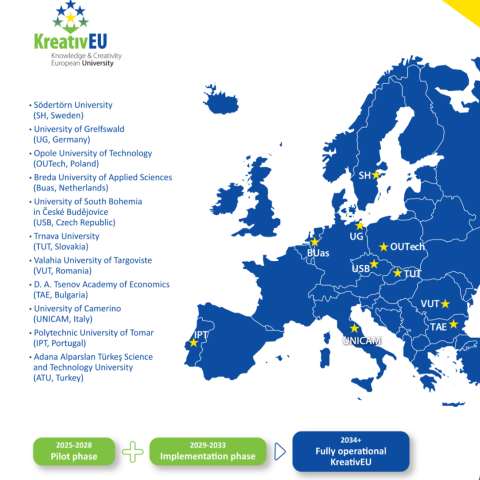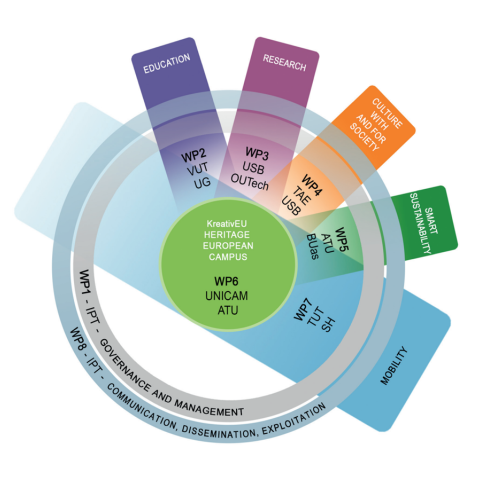European Universities shaping Higher Education
10/16/2024 - 14:53
- Uncover
Authors:
Giuliana Scuderi is a policy advisor and member of the Global Engagement Team at Breda University of Applied Sciences. She has supported BUas in joining KreativEU.
Marisa de Brito is a senior researcher at Academy for Leisure & Events operating within the Places and Flows research theme. Within KreativEU she is responsible for research strategic alignment with(in) BUas and stakeholder engagement with its partners.
BUas has joined the KreativEU University Alliance (Knowledge & Creativity European University), a decision that is going to shape our strategy for the coming decade. European Universities Alliances (EUAs) are collaborative networks of higher education institutes across Europe. They are established under the European Universities Initiative (EUI), which is part of the broader Erasmus+ 2021-2027 programme. The EUI aims to foster strategic partnerships among universities to enhance education, research, and innovation. By doing so, it seeks to improve the quality and international competitiveness of the European higher education sector. The initiative also emphasises community engagement and societal impact, positioning European Universities as models of best practices in these areas. Overall, the EUAs are designed to drive cooperation, enhance the global competitiveness of European education and research, and contribute to the innovation potential within Europe.
The European Commission supports the creation of these alliances by providing financial backing, to form 60 EUAs involving over 500 institutes by mid-2024, of which 50 EUAs are already financed. The final call for Erasmus+ funding, which was published in autumn 2023, represented the last opportunity for institutes like BUas to join an EUA.
Decision to join such an international alliance
The prospect of BUas joining an EUA has long been under consideration. In recent years, many of our partners have embraced these alliances, and we have repeatedly been presented with the opportunity to join. Yet, it was not until June 2023 that the Global Engagement Team initiated an in-depth evaluation of the pros and cons of participating in the EUI.
This evaluation highlighted that joining an EUA is not merely a short-term project but a strategic, long-term commitment to collaborate within a specific network of partners in education, research, and development. This commitment is made regardless of European funding outcomes and BUas must be ready to invest substantial resources to be part of this initiative, starting with strong support from the board and the president.
Since EUA-engaged universities are still the minority, numerous European funding opportunities remain open to all institutes. However, with several Dutch research universities and universities of applied sciences already in alliances, and governmental financial support for EUA members, those in the national arena are favourable to this initiative. Considering the broader European context, our key partners are increasingly committed to their alliances, which may limit future collaboration opportunities outside these networks. Finally, the unique level of cooperation and innovation within EUAs could propel BUas into a leading position among educational innovators, offering a significant learning curve.
For the above reasons, the assessment by the Global Engagement Team culminated in a ringing endorsement for BUas to actively seek membership, despite imminent challenges such as the fast-approaching February 2024 proposal deadline. In the hectic months following June 2023, potential pathways to EUA membership were diligently explored with a focus on a pragmatic approach that would enhance opportunities for joining while aligning with our strategic goals and core values. The decision to pursue engagement with unfunded but already existing alliances emerged as the most feasible strategy, capitalising on the robust foundations and clear visions of these groups. With this direction set, the quest to join an EUA commenced.
The consortium
In October 2023, a five-member delegation from BUas set out for Tomar, Portugal, to engage with the KreativEU Alliance (Knowledge & Creativity European University) for the first time. The KreativEU Alliance, at that juncture, was a consortium of seven institutes, including the Instituto Politecnico de Tomar (Portugal), Valahia University of Târgovişte (Romania), University of South Bohemia (Czech Republic), University of Trnava (Slovakia), Adana Science and Technology University (Turkey), D.A. Tsenov Academy of Economics (Bulgaria), and the University of Camerino (Italy).
United by the shared objective of creating a transnational European University, the KreativEU partners are dedicated to placing the creative potential derived from Europe’s cultural heritage at the heart of teaching, research, and knowledge transfer activities. By transforming the study of culture, identity, memory, and heritage, the alliance wants to cultivate a more creative, united, and robust Europe for the benefit of society and environment alike, and provide the EU with innovative concepts, methods, and solutions to address both current and future challenges.
Previously, the Alliance sought funding and, despite earning the European Commission's seal of excellence, was not successful due to a geographical imbalance in its partnerships. To address this, in 2023, the consortium extended invitations to four new partners, including BUas, Opole University (Poland), University of Greifswald (Germany), and Sodertorn University (Sweden), all of whom convened in Portugal that October.
The Alliance emerged as a synergistic fit for BUas, aligning with our strategic direction, vision, objectives, academic compatibility, focus, and cultural and social fit. All partner institutes (see Figure 1) are situated in historically significant cities and there is complementary expertise. Together, all the aforementioned universities have cultivated their collaborative institutional, structural, and strategic endeavours to the extent that they anticipate the establishment of a fully functional KreativEU European University by the year 2034.

Focus and Work Packages
The Alliance’s focus on Creative Heritage, in its broad sense, resonates with several of BUas’ research topics, such as Places and Flows, Experience Design, Digital Realities, and in particular Creative Placemaking and Cultural (Urban) Tourism. Adding to the appeal is the Alliance's focus on areas that connect with BUas' strategic themes Artificial Intelligence and Sustainability, further solidifying the connection between KreativEU's goals and BUas' strategic direction.
To realise the ambitious goal of establishing a dynamic, globally competitive European education and research framework rooted in the exchange of knowledge encompassing both tangible and intangible cultural heritage, fostering the advancement of both the European Research Area (ERA) and the European Education Area (EEA), the KreativEU Alliance is committed to executing eight strategic Work Packages (WPs), see Figure 2.

These packages are meticulously crafted to ensure an effective and equitable distribution of responsibilities among consortium members. Each partner will jointly oversee a minimum of one work package, with the lead partner, the Institute Polytechnic of Tomar (Portugal), taking charge of coordinating two work packages, namely WP1 and WP8.
The strategic implications for BUas within the European landscape
Internationalisation is essential for the future of education and research in Europe, and EUAs plays a crucial role in this regard. EUAs contribute to creating a more interconnected and engaged higher education sector, promoting cross-cultural understanding, fostering entrepreneurship, and promoting the exchange of ideas, so that member universities can contribute to advancing knowledge and addressing societal challenges more effectively.
Therefore, KreativEU represents a decisive commitment for BUas, poised to shape our global engagement strategy for the coming decade. BUas' active participation in the EUI signifies a deepened focus on Europe, aligning with our sustainability goals and marking a significant shift from our global focus. This strategic shift towards a European-centric approach is synergistic with tapping into funding available through programmes like Erasmus+ and beyond, serving as a driving force for rapid change and pioneering cross-disciplinary innovation. The Alliance's influence will extend across education, research, and community engagement, necessitating its integration into the fabric of BUas and the collective embrace of our entire community.
Sources
- KreativEU (2024), Knowledge & Creativity European University, Publisher: IPT – Polytechnic University of Tomar.
This article was published in Uncover Magazine - Internationalisation. You can read the complete magazine via this link.